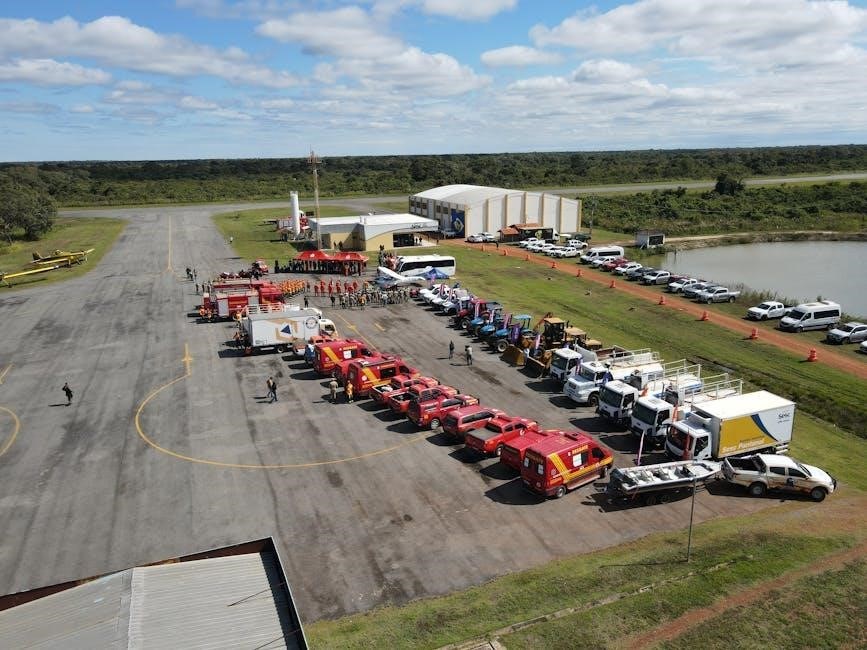Operations management is a critical function that ensures efficient planning, execution, and supervision of production and manufacturing processes. It involves overseeing daily operations, managing budgets, and optimizing workflows to enhance productivity. This role is essential for aligning business goals with operational capabilities, ensuring seamless coordination across departments and driving customer satisfaction through effective resource management.
1.1. Definition and Overview

Operations management is the administration of business practices aimed at maximizing efficiency and productivity within an organization. It encompasses the planning, execution, and supervision of production and manufacturing processes, as well as the management of resources and workflows to achieve organizational goals. An operations manager plays a pivotal role in this framework, overseeing daily operations, coordinating inter-departmental activities, and ensuring alignment with strategic objectives.

The role involves managing budgets, optimizing processes, and leading teams to enhance operational performance. Operations managers are responsible for streamlining workflows, reducing costs, and improving overall efficiency. They ensure that resources are allocated effectively and that production meets quality and safety standards. This function is critical for maintaining competitiveness and delivering value to customers.

By focusing on both operational excellence and strategic alignment, operations management ensures that an organization runs smoothly and achieves its long-term vision. The operations manager acts as a bridge between high-level strategy and day-to-day execution, making it a cornerstone of successful business operations.
1.2. Importance in Organizations
Operations management holds a pivotal role in ensuring the smooth functioning and success of organizations. By overseeing the production and delivery of goods and services, it directly impacts efficiency, productivity, and profitability. Effective operations management enables businesses to optimize resource allocation, streamline workflows, and maintain quality standards, thereby enhancing overall performance.
One of the key contributions of operations management is its ability to align operational activities with strategic goals. It ensures that daily operations support long-term objectives, fostering consistency and coherence across all departments. Moreover, it plays a crucial role in cost management by identifying inefficiencies and implementing cost-saving measures, which are essential for maintaining a competitive edge in the market.
Operations management also enhances customer satisfaction by ensuring timely delivery of high-quality products and services. By managing supply chains, inventory levels, and production schedules, it minimizes delays and disruptions, which can lead to increased customer loyalty and repeat business. Additionally, it supports innovation by creating an environment where new ideas and processes can be developed and implemented effectively.

Key Responsibilities
Operations managers oversee daily operations, ensuring efficiency and productivity. They manage budgets, optimize processes, and lead teams to achieve organizational goals. Key duties include project management, coordinating workflows, and implementing cost-saving strategies. Their role is essential for maintaining operational excellence, driving innovation, and aligning processes with strategic objectives to enhance overall business performance and profitability.
2.1. Project Management
Project management is a cornerstone of an operations manager’s role, involving the planning, execution, and monitoring of specific initiatives to ensure timely completion and alignment with organizational goals. Managers lead cross-functional teams, allocate resources, and set milestones to achieve project objectives. They also mitigate risks, resolve conflicts, and communicate progress to stakeholders, ensuring that deliverables meet quality and budget expectations. Effective project management enhances operational efficiency and drives innovation.
2.2. Team Leadership

Team leadership is a vital responsibility of operations managers, who are tasked with guiding and motivating employees to achieve organizational objectives. This involves fostering a positive work environment, setting clear expectations, and providing constructive feedback to enhance performance; Leaders must also promote collaboration, resolve conflicts, and empower team members to take ownership of their roles. By building trust and encouraging professional development, effective leaders cultivate a high-performing workforce that drives operational success and innovation.
2.3. Process Optimization

Process optimization is a cornerstone of an operations manager’s responsibilities, focusing on enhancing operational efficiency and reducing costs. This involves analyzing workflows to identify bottlenecks, implementing improvements, and ensuring that processes align with organizational goals. Operations managers use data analytics and performance metrics to monitor efficiency and make informed decisions. They also collaborate with cross-functional teams to streamline operations and adopt best practices. Additionally, they oversee the implementation of new technologies and systems to improve productivity and accuracy. By continuously evaluating and refining processes, operations managers ensure that the organization remains competitive and adaptable to market changes. This role requires strong problem-solving skills, attention to detail, and the ability to communicate effectively with stakeholders at all levels. Ultimately, process optimization enables organizations to deliver high-quality products and services while maintaining cost-effectiveness and scalability.
Operational Duties
Operational duties involve overseeing the day-to-day activities of an organization to ensure smooth operations. This includes managing production workflows, supervising staff, and maintaining quality standards. Operations managers are responsible for budgeting, cost control, and resource allocation. They also monitor performance metrics and address operational challenges to maximize efficiency and productivity while adhering to company goals and objectives.
3.1. Daily Operations Oversight
One of the primary operational duties of an operations manager is overseeing daily operations to ensure the smooth functioning of the organization. This involves monitoring workflows, supervising staff, and ensuring that all processes align with company goals and standards. The operations manager is responsible for identifying and addressing operational inefficiencies, resolving conflicts, and implementing corrective actions to maintain productivity.
Key tasks include managing inventory, coordinating schedules, and ensuring compliance with safety and quality protocols. They also oversee the maintenance of equipment and facilities, ensuring that all resources are utilized effectively. By maintaining open communication channels, operations managers can promptly address issues, making informed decisions to optimize day-to-day activities and achieve operational excellence.
This role requires strong problem-solving skills, attention to detail, and the ability to multitask. Effective daily operations oversight ensures that the organization runs efficiently, meets customer expectations, and maintains a competitive edge in the market. The operations manager acts as a central point of coordination, ensuring that all departments work cohesively toward shared objectives.
3.2. Budgeting and Cost Control
Budgeting and cost control are essential operational duties of an operations manager, ensuring the organization’s financial stability and sustainability. This involves creating and managing budgets, forecasting expenses, and allocating resources effectively to meet business objectives. The operations manager is tasked with analyzing financial data to identify cost-saving opportunities and optimizing spending without compromising quality or performance.
Key responsibilities include monitoring operational expenditures, ensuring compliance with budgetary constraints, and implementing cost-control measures. The operations manager must also evaluate financial risks and develop strategies to mitigate them. By maintaining accurate financial records and generating regular reports, they provide insights that support informed decision-making at the executive level.
Effective budgeting and cost control require strong analytical skills, attention to detail, and the ability to balance financial constraints with operational needs. The operations manager works closely with department heads to align budgets with strategic goals, ensuring that resources are allocated efficiently. This role is critical for maintaining profitability, reducing waste, and driving long-term growth.

Leadership and Team Management

Leadership and team management are fundamental responsibilities of an operations manager, ensuring that teams are motivated, aligned, and working effectively toward organizational goals. This role involves fostering a collaborative environment, promoting open communication, and encouraging employee engagement to drive productivity and innovation.

The operations manager is tasked with leading cross-functional teams, providing guidance, and setting clear expectations to ensure everyone understands their roles and responsibilities. They must also manage conflicts, resolve issues, and make decisions that support team cohesion and performance. Building trust and maintaining a positive workplace culture are essential components of this role.
Key duties include recruiting, training, and developing team members to enhance their skills and prepare them for future challenges. The operations manager must also monitor performance, provide feedback, and recognize achievements to maintain morale and encourage continuous improvement. They are responsible for fostering a culture of accountability, where team members are empowered to take ownership of their work.
Effective leadership and team management require strong interpersonal skills, emotional intelligence, and the ability to inspire and motivate others. The operations manager must also adapt to changing circumstances, lead by example, and demonstrate a commitment to excellence. By doing so, they create a high-performing team that contributes to the overall success of the organization.
